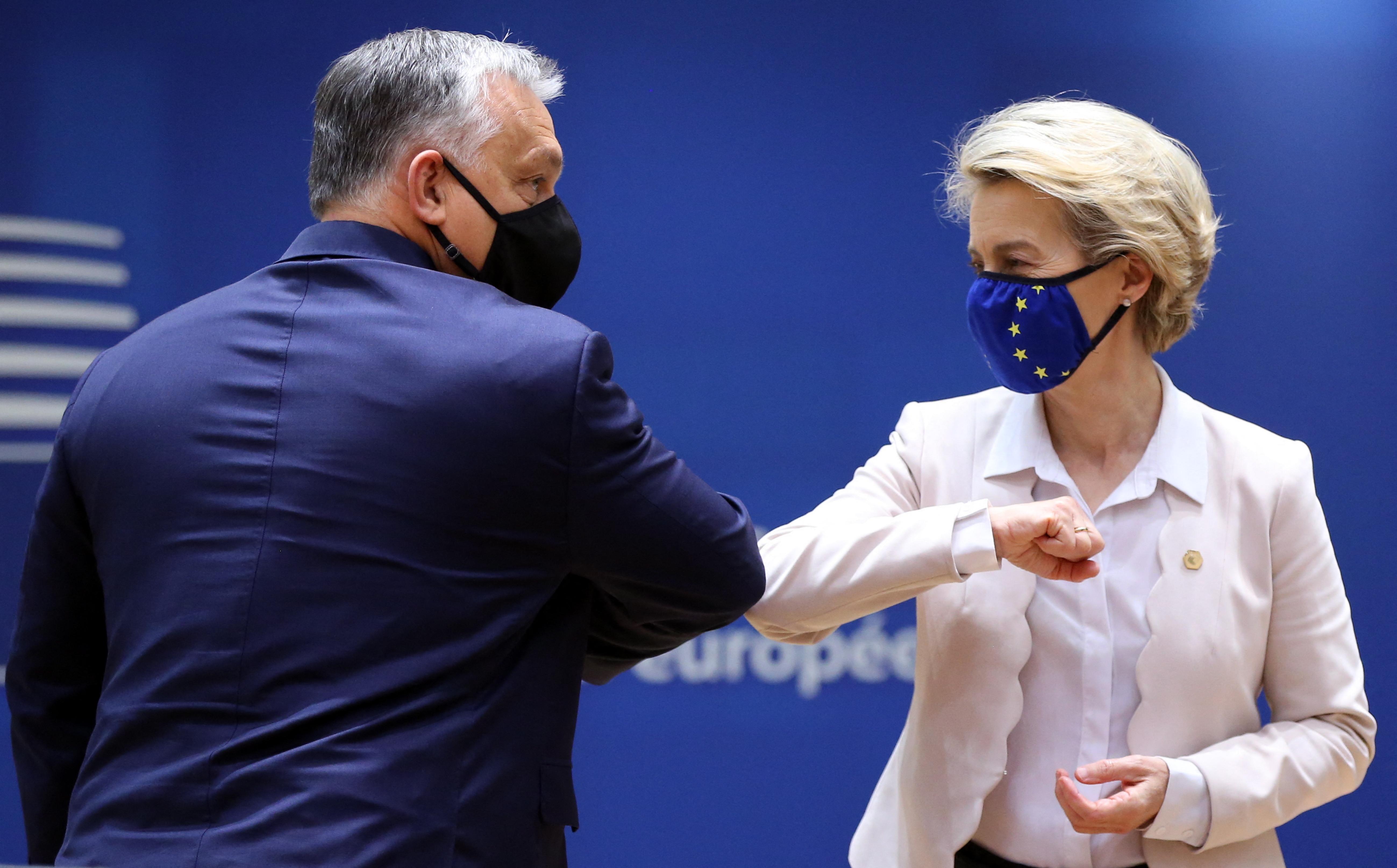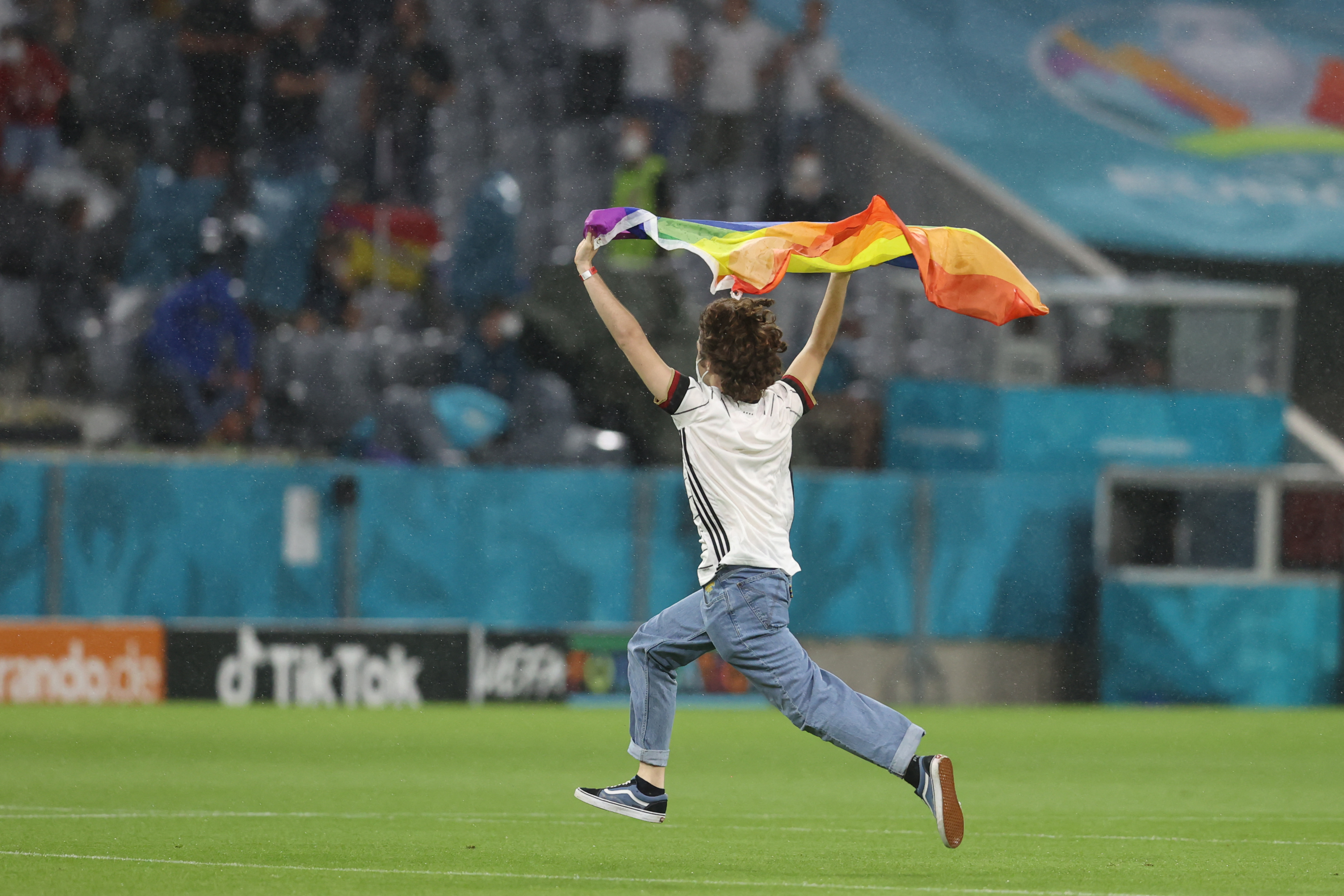Orbán skips Hungary's Euro match to meet with far-right Italian politician
- Stay updated on the latest news from Hungary by signing up for the free InsightHungary newsletter:
Reports in German media emerged Wednesday morning that Prime Minister Viktor Orbán would not travel to Munich as planned to view the Euro 2020 match between Hungary and Germany, where he likely would have received a cold welcome over his government's passage of a law seen as limiting the rights of LGBT people.
Instead, Orbán travelled to Brussels where he met with far-right politician Giorgia Meloni, leader of Italy's post-fascist Brothers of Italy party.
"Families and nations: this is the future of Europe," Orbán wrote on his Facebook page of the meeting alongside a photo of he and Meloni.
Government spokesman Bertalan Havasi told Hungarian news agency MTI that Orbán and Meloni exchanged views on changes in European politics and parties, and expressed their commitment to uniting the European right-wing and actively participating in the debate on the future of Europe.
They agreed that right-wing parties must strongly represent the interests of the many millions of European citizens who believe in the traditional family model, a strong Europe based on strong nations, and our common cultural and religious roots, Bertalan said.
The meeting with Meloni could be the latest sign of Orbán's effort to consolidate Europe's right-wing forces into a new political formation after his Fidesz party left the center-right European People's Party (EPP) in March.
In April, Orbán hosted his Polish counterpart Mateusz Morawiecki and former Italian interior minister Matteo Salvini in Budapest to discuss a potential alliance on the European level. Fidesz is still without a group in the European Parliament.
Meloni is the head of the European Conservatives and Reformists (ECR), a nationalist grouping of parties that also includes Poland's ruling PiS, Spain's Vox and, formerly, the United Kingdom's Conservatives.
Meloni told journalists on Wednesday that Orbán does not want to bring Fidesz into the ECR at the time being, but that the party would be welcome if he did. Foreign newspapers wrote on Tuesday that while in Brussels, Meloni would also hold a joint meeting with Slovenian Prime Minister Janez Janša and Polish Prime Minister Mateusz Morawiecki.
Hungary's anti-LGBT law draws international criticism ahead of Euro 2020 match
Hungary's 2-2 draw with Germany at Wednesday's Euro 2020 football match in Munich was a significant achievement for the Hungarian team, but tainted by an international uproar over Hungary's passage of a law widely seen as targeting Hungary's LGBT community.
Last week, Hungarian lawmakers approved the controversial bill that human rights groups condemned as an attack on LGBT rights. Initially billed as a way of cracking down on pedophilia, the law bans the "portrayal or promotion of homosexuality," and forbids the display of any content portraying homosexuality or sex reassignment to children under 18.
Hungary's president, János Áder, signed the law on Wednesday. It will go into effect 15 days later.
While government figures from Foreign Minister Péter Szijjártó to Prime Minster Viktor Orbán defended the law as merely intended to protect children, it was widely condemned as a limitation of LGBT rights and a conflation of homosexuality with pedophilia.
High-ranking European politicians slammed the legislation. European Commission president Ursula von der Leyen on Wednesday called the law "a shame," saying it "clearly discriminates against people based on their sexual orientation. It goes against the fundamental values of the European Union: human dignity, equality and respect for human rights.”
She said the commission would examine whether the legislation contravenes EU law, and vowed to "use all the powers of the commission to ensure that the rights of all EU citizens are guaranteed."
Hungary's government clapped back against Von der Leyen's statement, saying it was "based on false allegations" and a "biased political opinion without a previously conducted, impartial inquiry.”
Also on Wednesday, German Chancellor Angela Merkel said to Germany's parliament that “this law is wrong, and it’s incompatible with my idea of politics -- if you allow homosexual, same-sex partnerships but restrict information about them elsewhere, that also has to do with freedom of education and the like.”
Additionally, 17 of the EU's 27 member states signed a joint statement condemning the law, writing it "represents a flagrant form of discrimination based on sexual orientation, gender identity and expression and hence deserves to be condemned." The leaders urged the European Commission to take the law to the European Court of Justice.
The uproar extended all the way to the mayor and city council of Munich - the host of Wednesday's Euro 2020 match between Germany and Hungary - which asked UEFA, European football's governing body, for permission to illuminate the city's Allianz Arena in rainbow colors in a sign of support for LGBT rights. The UEFA denied the request, saying it was directed at a decision taken by Hungary's parliament and therefore too political.
Arriving at a meeting of the European Council in Brussels on Thursday, Orbán told reporters that Hungary's law is "not about homosexuality, it’s about the kids and the parents.”
“I’m was a freedom fighter in the Communist regime. Homosexuality was punished and I fought for their freedom and their rights,” he said. “I am defending the rights of homosexual guys but this law is not about them.”
Karácsony: Budapest will provide free antibody tests to older residents
Budapest's mayor plans to offer free antibody testing to older residents of the capital after some vaccine recipients have reported they failed to develop antibodies following two doses of a jab.
"In light of the serious doubts about the effectiveness of the Chinese vaccine and the many inquiries that we've received, the capital city will launch a free antibody testing program to protect our elderly compatriots and increase confidence in vaccines," Mayor Gergely Karácsony told website Azonnali on Thursday.
Many Hungarians have had themselves tested at their own expense at private laboratories to monitor whether adequate protection from Covid-19 has developed in their bodies following vaccination.
But a significant number of those tests have shown little to no antibody development, leading to the foundation of a Facebook group dedicated to sharing information and experiences among those who test negative for antibodies after receiving China's Sinopharm vaccine.
With around 5,500 members, the group demands the government provide a third dose of an mRNS vaccine, such as Pfizer or Moderna, to Sinopharm recipients older than 60.
In a press release, the Mayor's office wrote that 19,000 tests will be made available to Budapest residents older than 60, but did not mention the Sinopharm vaccine.
"The capital wishes to offer the opportunity to those aged 60 and over to map their established immunity," the office wrote. "A number of NGOs have appealed to the government and the press after certain vaccines were administered and no antibodies were detected in the blood of their members. Similar problems have led several countries to order a third vaccination."
Mask restrictions to be lifted as Covid numbers tumble
The wearing of masks will no longer be required in Hungary once 5.5 million people have received a first dose of a Covid-19 vaccine, the prime minister's chief of staff Gergely Gulyás told a government press conference on Thursday.
Once that threshold is reached, likely within a week, Hungarians may visit hotels, restaurants, spas and beaches without an immunity card, Gulyás said. However, sporting events, concerts, festivals, and other entertainment venues will continue to require the card proving the bearer has been vaccinated or recently recovered from the disease.
Border controls at internal Schengen borders have also been lifted, Gulyás noted.
Only a single Covid-19 death was recorded in Hungary on Thursday, the lowest daily total since September 11, 2020, while the number of those being treated for the disease in hospitals dropped to 215, also a record low since last September.
A daily average of around 10,000 first-dose vaccinations are being administered, a plateau showing that most Hungarians who wish to receive a vaccine have already gotten one.





